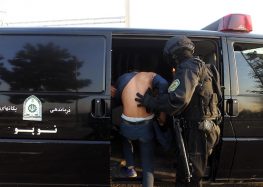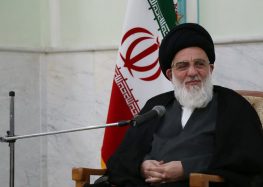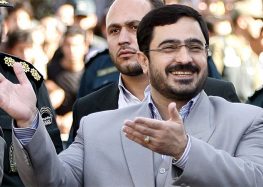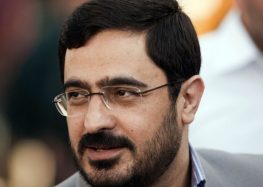Mohammad Davari’s Health Condition Deteriorates in Prison
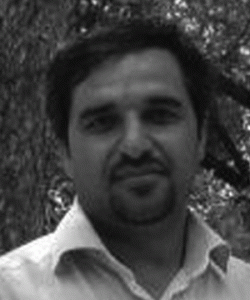 Mohammad Davari, former editor-in-chief of Saham News website, has developed acute psychological illness in prison and is in critical condition, his brother Bijan Davari told the International Campaign for Human Rights in Iran in an interview. “Mohammad is not well at all. Besides psychological problems, he has chest pains and his teeth have gone bad,” he said.
Mohammad Davari, former editor-in-chief of Saham News website, has developed acute psychological illness in prison and is in critical condition, his brother Bijan Davari told the International Campaign for Human Rights in Iran in an interview. “Mohammad is not well at all. Besides psychological problems, he has chest pains and his teeth have gone bad,” he said.
Mohammad Davari was arrested in 2009 after political opposition leader Mehdi Karroubi wrote a letter to head of the Council of Experts reporting the torture of political prisoners inside Kahrizak Detention Center. Security forces tortured Davari in prison, pressuring him to make television confessions against Karroubi. Iranian authorities sentenced Davari to five years in prison, which in 2011 was increased to six years. The last year of imprisonment was added due to Davari’s inability to pay a $5,000 cash fine for a teachers’ protest he attended in February and March 2006. Davari is a union activist and member of the Central Council of the Iranian Teachers Association. He is also a disabled Iran-Iraq War veteran.
International Campaign for Human Rights in Iran: Has Mohammad Davari seen a doctor? Has he been able to leave Evin Prison on medical furlough?
Bijan Davari: Because of Mohammad’s poor psychological condition, prison authorities allowed us to take him to a psychiatrist a while back. The doctor said that we should post bail for him so that he can leave the prison for a while, because his psychological condition is very poor. The judge and the prosecutor told us to go and bring a property deed [to use as bail collateral], so that they could give him furlough. We looked everywhere and finally came up with a deed, but Mohammad would not accept it. He said, “I did not commit a crime, so I should not need to come up with a collateral for my release.” He said they should give him furlough without collateral.
Campaign: When was the last time you saw your brother in Evin Prison?
BD: Two weeks ago, we went to Tehran for a visit, but unfortunately, they did not allow us to visit with him, and only our mother was able to see Mohammad. After she came out of the visitation hall, she said that Mohammad is not well at all. Besides psychological problems, he has chest pains and his teeth have gone bad. A while back, we submitted the names of several doctors to prison authorities, but they did not accept this and said we should submit the names of other physicians. Maybe they thought these were Mohammad’s friends. After … the prolonged process, [Mohammad] gave up on the issue and so did we. He needs to go on furlough for a while and then he can attend to all his problems.
Campaign: What were the charges against Mohammad Davari?
BD: Well, more than two years since Mohammad’s detention, we still truly don’t understand for what crime he went to prison; we never understood what crime he committed. But we are also afraid to say anything and face accusations ourselves. You know how hard it is to earn a livelihood these days. We don’t have the financial resources, nor the strength to confront this. We cannot do anything. You must see his old mother; she has lost her husband, has no source of income, and cannot do anything at all. But every week, in the cold Bojnourd winter, she goes to Tehran to see Mohammad through a booth for a few minutes. What can I say?
Campaign: Has your brother had any other contact with the court, besides his furlough requests?
BD: During the first month after Mohammad was detained and we were pursuing his case in Tehran, his home was burglarized and his car was stolen. Some people had entered his home and taken away many of his household items, all his documents and his computer. Unbeknownst to us, they had also taken his checkbook. Now we see that he is routinely summoned to the court. Unidentified individuals have used his checks, which have then bounced. Neither Mohammad nor we know any of the people who have signed the checks. We have filed a complaint, stating that Mohammad has not drawn these checks, but the judge says that the checks were drawn using his name and we must be accountable.

